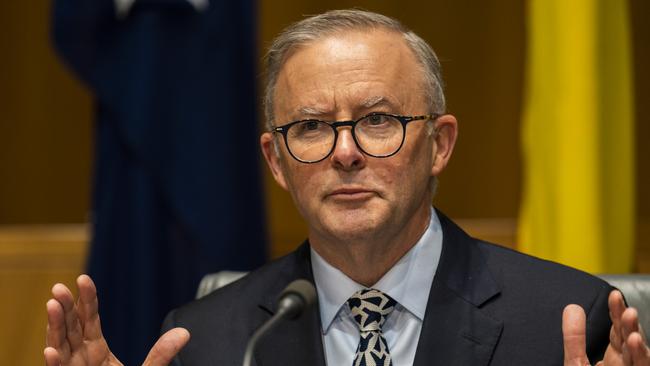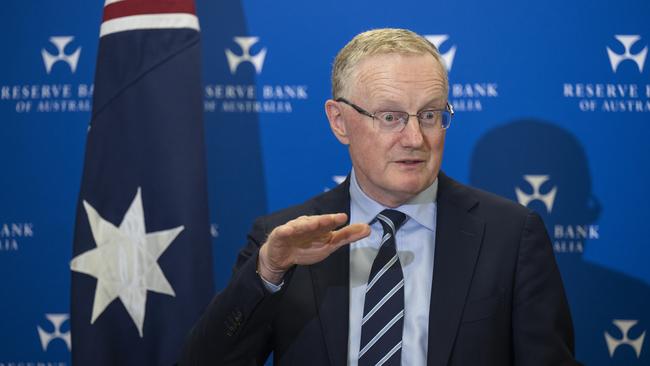
Reporters took heart from ACTU secretary Sally McManus, who on June 23 said concern about excessive wage rises as inflation takes off around the world was a “baby boomer fantasy”. Many young reporters have never experienced a full-blown wages breakout, soaring inflation or even a recession.
Reporters with tertiary journalism or communications qualifications who have been taught how to “speak truth to power” might have learned more of practical use with generalist arts degrees majoring in history and economics.
Labor politicians too should re-read the history of their own party’s reform of the labour market in the wake of an ACTU-led wages breakout in the early 1980s that destroyed a million jobs. A Reserve Bank paper on economic developments in 1980-81 shows average weekly wages that year rose 13.5 per cent.
The journos on the couch on ABC Insiders on Sunday, June 26, seemed to think concern about inflation was just “so last century”. Sean Kelly, former Labor staffer to Labor prime ministers Julia Gillard and Kevin Rudd and now a columnist for the Nine newspapers, was not too concerned about the recent 5.2 per cent pay rise from Fair Work Australia to workers on minimum wages.
Guardian Australia political reporter Amy Remeikis could see little risk of a flow-on to award wages and thought the Reserve Bank should not be using interest rates to contain inflation. Her alternative? Free universal child care would surely take the pressure of rising prices off Australian families.

Host David Speers did not suggest that would only add fuel to the inflationary fire or that the whole point of using monetary policy against inflation was to make spending tougher.
Remeikis and Kelly even cited, without irony, former RBA governor Bernie Fraser who had recently criticised business for wanting a cap on wage rises without mentioning a cap on profits.
Fraser became governor of the RBA in September 1989. That Christmas, the RBA cash rate was 17.5 per cent, triggering what former PM, and treasurer at that time, Paul Keating, described in November 1990 as “the recession we had to have”.
Some journalists have even supported a super-profits tax. That might help to reduce government debt but would do zero to reduce inflation. Writing in The Australian Financial Review on June 28, Steven Hamilton, assistant professor of economics at George Washington University, said: “The fact is that a third to half of the company tax burden falls on workers via lower wages and employment. If you were to design one (super-profits tax) perfectly, so it had no impact on workers, it would make inflation higher … by redistributing profits to those more likely to spend.”
As News Corp’s Terry McCrann wrote on Tuesday, the one serious mistake the new government has made in its first weeks has been the loose talk on wage rises. It’s a mistake it may come to regret.
Unions that have lost members for three decades are ramping up industrial action and journalists who should know better are supporting it. Witness Patricia Karvelas on RN Breakfast last Thursday demanding to know if new Workplace Relations Minister Tony Burke was backing NSW teachers in their campaign for rises between 5 and 7.5 per cent.
Karvelas did not tell her audience NSW already has the nation’s highest-paid teachers, outside the NT.
Back to the Insiders couch for some more Guardian wisdom. Remeikis rejected a suggestion from this newspaper’s Greg Sheridan that Australia needed to guard against a repeat of 1970s stagflation: “The circumstances are very different to what we saw in the ’70s. I know we’re starting to use the word stagflation again but … the same things that eventually played out in the ’70s are not necessarily going to play out now.”
The older and wiser Sheridan was hawkish on inflation, having experienced it as a working journo. Actually the stagflation of the 1970s oil shocks really does feel similar to today’s soaring power prices in the wake of the Russian invasion of Ukraine, the collapse of renewables during the last European winter, and supply chain disruptions in the wake of Covid.
Less than 12 hours after Insiders, The Australian Financial Review online reported a warning from the Bank of International Settlements – “the international club of central bankers controlling inflation” – calling for “front-loaded” interest rate hikes to avoid 1970s-style stagflation. They can’t have heard Remeikis.
“If central banks failed to tame inflation AND WAGE CLAIMS (my emphasis), interest rates would need to rise sharply, risking ‘large drops in asset prices (that) could trigger a sharp recession and financial stress’,” the BIS said.

Earlier that afternoon, RBA Governor Philip Lowe, speaking in Zurich, expanded on his statement of the previous week in which he sought to put a lid on wages growth at 3.5 per cent, and explicitly warned larger rises across the board could trigger a 1970s-style wage-price spiral. Lowe said Australian businesses were lifting prices as workers began demanding pay rises to keep pace with inflation. He could never say so but unions clearly feel the PM has green-lighted this approach.
“You can understand why people faced with higher inflation want compensation for it, especially when the unemployment rate is as low as it is. So there’s a shift in the inflation psychology of the country,” Lowe said.
Treasurer Jim Chalmers also chimed in, backing McManus but also supporting Lowe’s warnings: “If you let inflation get out of control that’s damaging for people’s living standards. And we want wages growth to be sustainable.”
Readers may think this is all a little technical for a media column. But the left media’s cynicism about inflation, budget repair, wages breakouts and tighter monetary policy reflects changes in the thinking of journalists who are now more concerned about reporting social change and equality for minority groups, than they are with looking at the wider economic betterment of society.
Where Keating trained a generation of journalists to think about current account deficits, decentralised wage-fixing and international competitiveness, the present crop is more interested in campaigning on identity issues and extra government money for any group claiming victimhood. Keating used to say the best thing society can give the poor is a job. He made the case for economic reform on equity grounds.
Unfortunately for the media, the lessons of Rudd’s 2009-10 global financial crisis stimulus and the Coalition’s 2020-21 blowout in Covid spending have been to reinforce the idea government is a bottomless pit of money and every group with a whinge needs reporters to advocate for federal funding for it. This has only been possible in fiscal terms because the country’s spending binge has been underwritten by a commodities export boom, particularly in iron ore, coal and gas.
Yet many journalists think the path to a better future lies with the end of coal and gas extraction in Australia.
Albanese and Chalmers will have a tough job re-educating the media class about the benefits of economic growth and the dangers of unfettered spending and unchecked inflation. Journalists who think life is bad for many Australians now will get a surprise when they learn how bad it can get during a recession.








Journalists at the ABC and Guardian Australia have been backing a union push for higher wages across industries since Anthony Albanese signalled his support during the election campaign for workers to receive pay rises that keep up with inflation.